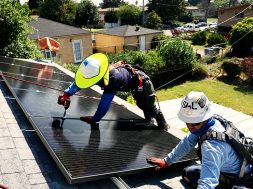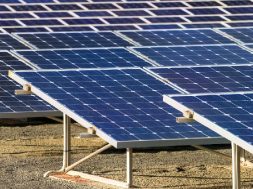
MSU’s solar power plant nearing completion
To be launched in a fortnight, it will generate two lakh units
Installation of 1.20-MW photovoltaic panels on the Manonmaniam Sundaranar University premises at the cost of Rs. 4.50 crore is nearing completion. The project will be launched in a fortnight.
Since the MSU’s Abhishekapatti premises, the main campus, has a sprawling campus with black cotton soil on the Tirunelveli – Tenkasi Highway, which conducive for solar power generation with bright sunshine for almost nine months a year, the proposal for installing solar power panels to convert the premises into a ‘green campus’ was mooted by Vice-Chancellor K. Baskar recently.
As the report on the project was ready for execution, Ministry of Human Resource Development’s Rashtriya Uchchatar Shiksha Abhiyan (RUSA) scheme came in handy for the MSU.
While Rs. 3.50 crore has been spent on installing the photovoltaic systems, the remaining Rs. 1 crore earmarked for creating the infrastructure required for transmitting the surplus power to the green corridor grid at Pettai.
With the project getting approved by the MHRD, work on the installation of solar power panels commenced recently.
The solar power panels being installed on five acres of land on the university’s Abhishekapatti premises will generate two lakh units.
The MSU, after consuming 1 lakh units for its requirements, will transmit the remaining 1 lakh unit to generate additional revenue.
In other words, the project cost of Rs. 4.50 crore funded under RUSA scheme, will be got back within six years by selling the surplus power to Tangedco (Tamil Nadu Generation and Distribution Corporation).
“MSU will become the first educational institution in the country to generate solar power of this quantum and to transmit the surplus power to Tangedco’s green corridor grid,” said Dr. Baskar, on whose initiative the MSU has introduced one-year programme on ‘Postgraduate diploma in renewable energy management and auditing’ with monthly stipend of Rs. 1,000 from this academic year onwards.
“Students joining this programme can have their field work on our solar power plant itself,” said Dr. Baskar.
The university is also actively exploring the possibilities of installing windmills as heavy westerly wind would lash the sprawling premises relentlessly for four months every year between June and September.
Moreover, wind power generation would be significant during the northeast monsoon also in this region.
He also informed that the university has also been sanctioned Rs. 1.50 crore research project from RUSA’s Innovation and Research Scheme for developing Solid Oxide Fuel Cell (SOFC) and Sodium ion batteries which can replace the costly Lithium ion batteries.
“We’ve planned to carryout this research by reducing the operational cost and the temperature of SOFC (from current 800 degree Celsius to 600 degree Celsius) by using yttrium stabilised zirconium electrolyte. We’ll be in a position to develop the prototype fuel cell-based vehicle within two years,” Dr. Baskar said.
If the SOFC project can accomplish the expected outcome, it will end up in fabricating the energy efficient fuel cell with greater storage and hence will be very much useful for the armed forces deployed in remote areas, he said.















